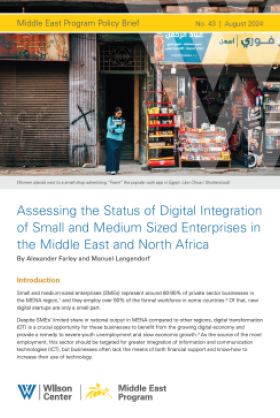Assessing the Status of Digital Integration of Small and Medium Sized Enterprises in the Middle East and North Africa



Small and medium-sized enterprises represent around 80-90% of private sector businesses in the MENA region, and they employ over 50% of the formal workforce in some countries. Of that, new digital startups are only a small part. Despite SMEs’ limited share in national output in MENA compared to other regions, digital transformation is a crucial opportunity for these businesses to benefit from the growing digital economy and provide a remedy to severe youth unemployment and slow economic growth. As the source of the most employment, this sector should be targeted for greater integration of information and communication technologies (ICT), but businesses often lack the means of both financial support and know-how to increase their use of technology.
In this Policy Brief, the authors analyze the status of internet coverage and usage in the Arab States region, noting prominent divides between gender and urban and rural users. They then present an original analysis of multi-level data of a sample of SMEs from Morocco, Jordan, and Egypt collected by the Economic Research Forum to examine the level of ICT integration they currently experience. The brief concludes that, though there is basic awareness of the use of ICT among SMEs in the region, especially those over 50 employees, there is still limited integration of these technologies in reaching new customers or facilitating sales, limiting their overall impact on business operations and expansion.



The Wilson Center’s Middle East Program serves as a crucial resource for the policymaking community and beyond, providing analyses and research that helps inform US foreign policymaking, stimulates public debate, and expands knowledge about issues in the wider Middle East and North Africa (MENA) region. Read more


